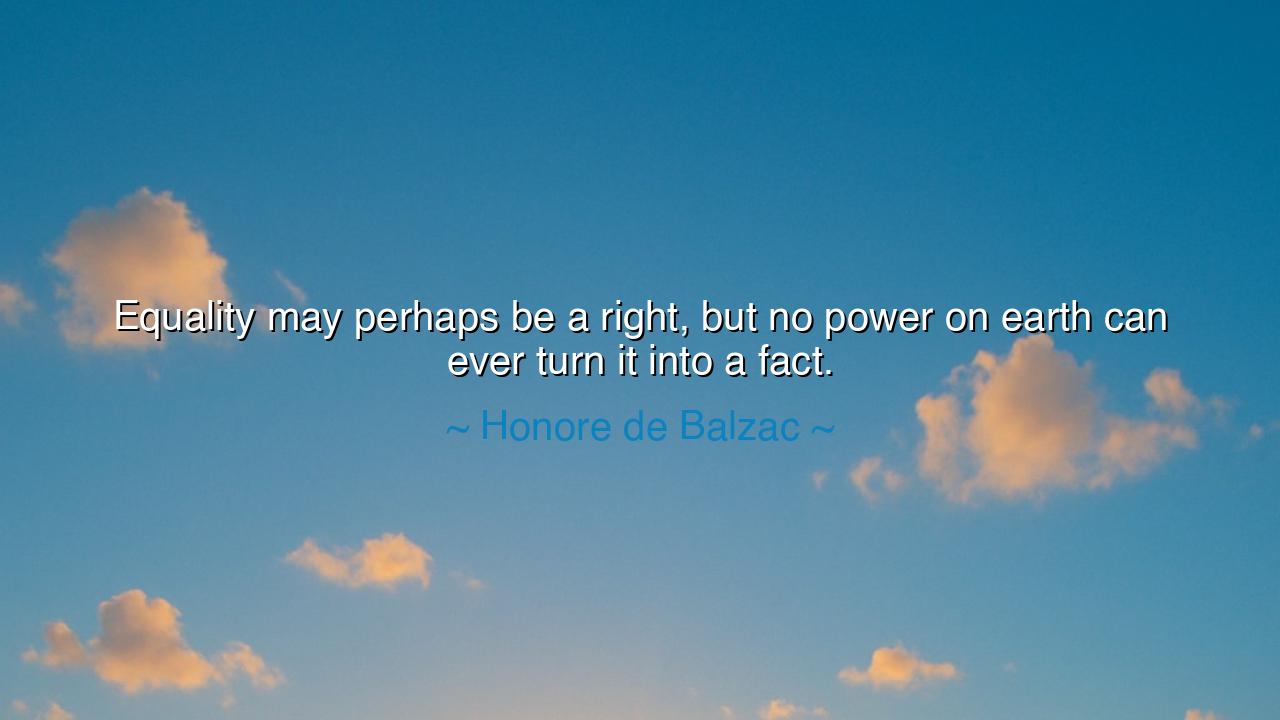
Equality may perhaps be a right, but no power on earth can ever






When Honoré de Balzac declared, “Equality may perhaps be a right, but no power on earth can ever turn it into a fact,” he spoke as a man who saw deep into the heart of human society and the hidden forces that shape it. These words, forged in the crucible of 19th-century France, reflect both the brilliance and tragedy of human aspiration. Balzac, who chronicled every layer of society in La Comédie Humaine, understood that though men may be declared equal in law, they are never equal in nature, in opportunity, or in desire. His statement is not cynicism—it is realism, sharpened by wisdom. He reminds us that equality, while noble in spirit, will always wrestle with the vast inequalities born of ambition, birth, and the frailty of the human heart.
In the style of the ancients, we might say that Balzac spoke as a philosopher of the fallen world. Like the sages of old who saw how fate and fortune twist men’s lives, he understood that no decree, no revolution, no empire can make all men the same. For though laws may proclaim equality, nature itself weaves difference—in strength, in wit, in courage, in will. To demand perfect equality is to ask the sea to be still. Humanity, Balzac suggests, is built upon contrast: light and shadow, wealth and want, genius and simplicity. It is this diversity that drives civilization forward, even as it divides it.
The origin of this quote lies in Balzac’s observation of post-revolutionary France. The Revolution had promised liberty, equality, fraternity, but its aftermath revealed that while thrones may fall, hierarchy merely changes its form. The nobles had lost their crowns, but new elites—merchants, bankers, industrialists—rose to take their place. In this, Balzac saw the eternal cycle of power: that society, like nature, abhors a vacuum. When one class descends, another ascends. Thus, equality, though written into constitutions, remains an ideal—ever pursued, never attained. Balzac’s genius was in seeing that even in an age of progress, the hunger for power and possession would always outpace the dream of fairness.
Consider the story of Napoleon Bonaparte, a man who rose from obscurity to rule an empire in the name of equality and merit. Yet in his rise, he crowned himself emperor, creating a new aristocracy of generals and ministers. What began as the triumph of common men became the restoration of hierarchy by another name. In Napoleon’s life we see Balzac’s truth made flesh: equality may be declared by revolution, but ambition will always carve new thrones. Humanity, driven by pride and longing, cannot live long without distinction.
Yet Balzac’s words do not condemn the pursuit of equality—they illuminate its paradox. For even if absolute equality cannot exist, the striving for it ennobles the human race. The ancients would have called it the virtue of justice—to seek balance, even knowing perfection is impossible. Equality may not be achievable as a fact, but as an aspiration it keeps tyranny in check, tempers arrogance, and inspires compassion. The world may never be level, but the heart that fights for fairness remains noble.
We may also see this reflected in modern times. Nations proclaim democracy and equal rights, yet inequality endures—in wealth, in opportunity, in voice. Technology connects us, yet divides us further. Still, it is in our striving, our constant correction of injustice, that progress is born. Equality as a right is the torch that lights civilization’s long road, though no man may carry it to the end. Balzac, though skeptical, did not mock the ideal—he merely warned that to mistake the ideal for reality is to walk blind.
The lesson of Balzac’s wisdom is to love truth more than illusion. Do not despair that equality cannot be perfect; instead, work to make it fairer where you stand. Recognize that nature’s differences need not be injustices, but they must never be excuses for cruelty or arrogance. A wise man honors the diversity of gifts among people, yet uses his own to uplift those with less. Thus, though equality may never be fully achieved, justice and mercy can thrive—and these, too, are divine forms of equality, born not from law, but from the heart.
So let this truth be passed down: no power on earth can make all men equal, but every soul can strive to make the world more just. The dream of equality is not meant to be fulfilled—it is meant to guide. For in chasing what cannot be possessed, humanity becomes greater than it is, ever reaching toward the light of what it might yet be.






AAdministratorAdministrator
Welcome, honored guests. Please leave a comment, we will respond soon